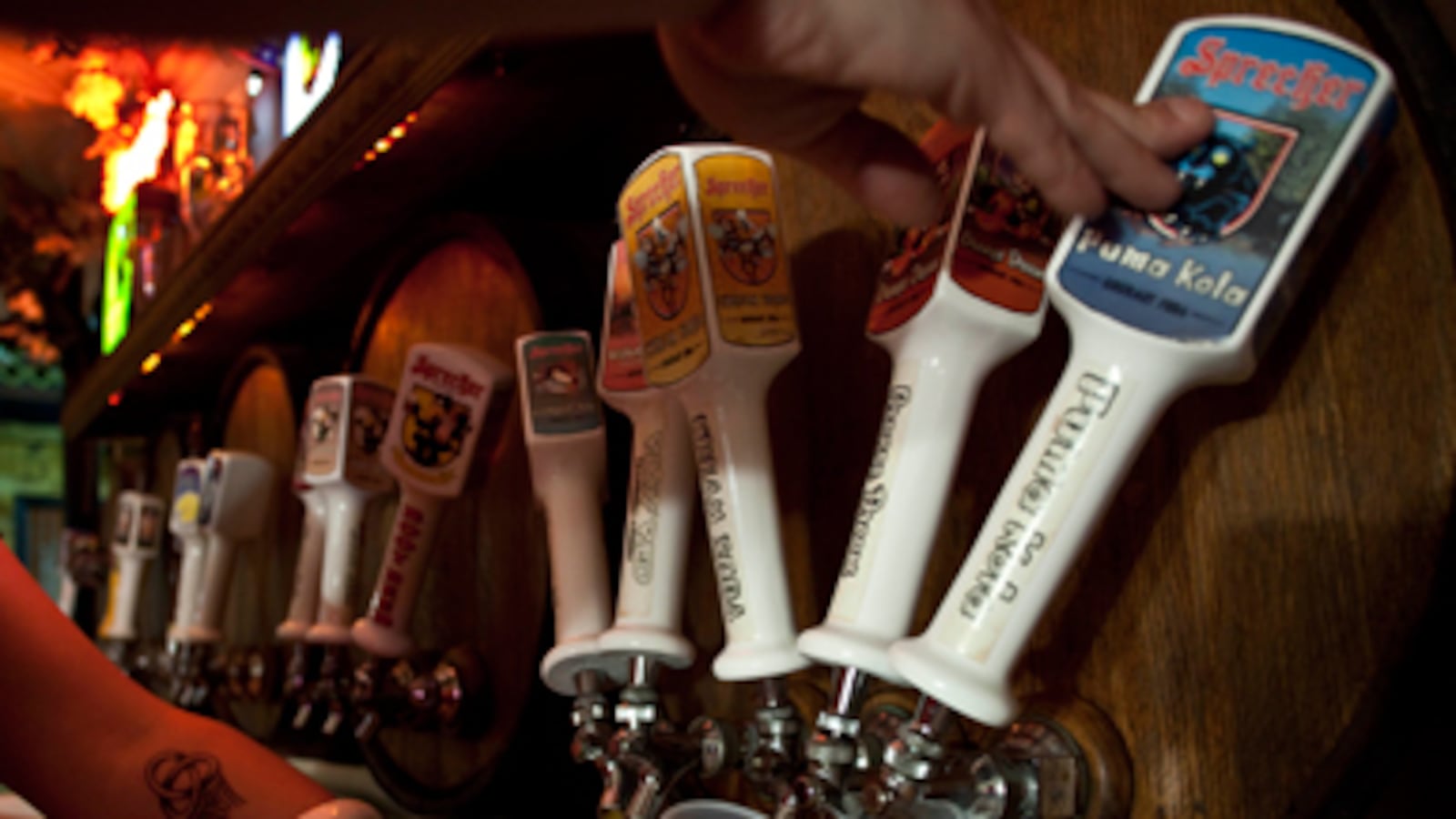Lawmakers who normally wouldn't warm a couple of bar stools together are brewing up some bipartisanship to slash the federal excise tax on small beer producers.
The sudsy collaboration prompted gushing from two senators who rarely agree—but are together behind this bill. "If beer can't do it, nothing can!" enthused Democrat Chuck Schumer of New York. "Maybe if we drink more of it, we'd have a better level of bipartisanship," added Republican Richard Burr of North Carolina.

Both senators, it turns out, enjoy generous political support from the beer, wine, and liquor industries, according to figures compiled by the Center for Responsive Politics. Schumer was No. 1 ($155,600), and Burr No. 4 ($66,600) on a ranking of PAC and individual donations to Senate campaigns in 2009-2010.
While Republicans and Democrats are battling over huge budget deficits and painful spending cuts, a more convivial group is clinking glasses across the aisle to support the Brewer's Employment and Excise Relief Act, or BEER. The government would forfeit an estimated $67 million in excise tax revenue over five years, according to a study financed last year by the Brewers Association and published by a Harvard professor.
Sponsors of the legislation are touting the Harvard study, seizing on its projection that 4,200 new jobs over five years could be created as a result of increased economic activity sparked by tax relief for small brewers. The sponsors, when asked how the beer break squared with looming budget cuts, all cited job creation.
"When we tell them that small brewers represent just 5 percent of the market by volume, but contribute 50 percent of the jobs in the domestic beer industry, they say, 'What? Can you tell me that again?'" Pease says.
"Microbrewing and small brewing is creating a lot of jobs," Schumer told the Center for Public Integrity. "It's also, because there are brew pubs at these breweries, revitalizing downtowns and bringing lots of young people back downtown.
"The excise tax is heavy, too heavy for a small business."
The move comes as microbreweries around the country are booming. The craft-beer industry grew 11 percent in terms of volume in 2010, while the overall beer industry was flat.
But more than the minor players would benefit. Lowering the excise tax, which has not changed since 1976, would also help a handful of well-known brewers whose success outstripped the tax code's embrace of "small."
The tax effort—combined with an attempt to expand the category of small brewers from 2 million to 6 million barrels per year—went nowhere in the last Congress. But last November's election results encouraged the brewers to try again. "With the Republican majority in the House, the climate is even more favorable," said Bob Pease, the Brewers Association's chief operating officer.
Pease says his team squired brewery owners representing some of the nation's more than 1,700 small beer producers during a March 28 lobbying assault on staffs representing 42 members of Congress and five senators.
"When we tell them that small brewers represent just 5 percent of the market by volume, but contribute 50 percent of the jobs in the domestic beer industry, they say, 'What? Can you tell me that again?'" Pease says.
Some states are pushing similar relief; a measure in Massachusetts would also set the small-brewer threshold at 6 million barrels a year. As with the federal effort, the legislation is heartily supported by the Boston Beer Co., creator of Samuel Adams, the largest American-owned brewery. For 2010, Boston Beer reported volume of about 2.3 million barrels for the year.
By the end of March, 25 senators from both parties – including eight members of the Finance Committee – were on tap for BEER, introduced by Massachusetts Democrat John Kerry along with Mormon teetotaler Mike Crapo, an Idaho Republican. The malt barley industry is the fastest-growing agricultural sector in Idaho, thanks to multinational brewers such as MillerCoors and Anheuser-Busch InBev, which are buying barley from farmers and building production facilities.
The CEO and founder of the Boston Beer Co., Jim Koch, made $4,800 in contributions to Kerry's campaign war chest in December.
Among the senators supporting the beer legislation to date, the industry favorites in the last cycle, in addition to Schumer and Burr, were Ron Wyden (D-OR), $77,122; Patrick Leahy (D-VT), $54,000; Patty Murray (D-WA), $50,774; David Vitter (R-LA), $48,900; and Idaho's Crapo, $38,333, according to the Center for Responsive Politics.
The nine House sponsors include Richard Neal (D-MA) got $54,528 from beer, wine and liquor interests in 2009-2010; Charles Boustany Jr. ( R-LA), $15,000; Peter DeFazio (D-OR), $12,662; Jim Gerlach (R-PA), $12,000; Earl Blumenauer (D-OR), $10,865; and Duncan Hunter (R-CA), $10,500.
Burr, who says he backs the excise tax bill on states' rights grounds, is not optimistic.
"It's very unlikely that anything like that will come out of the United States Senate," he says. "It's just not in the cards, because we're going to be all-consumed with spending, deficit reduction and debt. That's going to be the 800-pound gorilla."





